- Home
- Linwood Barclay
Bad Move Page 3
Bad Move Read online
Page 3
“Where I wouldn't be able to see it.”
“Yes. That, that was the plan.”
“And when I went to look for the keys, I wouldn't be able to find them, and then when I saw that the car was missing, I'd think it was stolen, and would have a fucking heart attack so that you could make a point, is that about right?”
“It was never my intention to give you a heart attack or anything. It was merely intended as a, well, as a lesson.”
“A lesson.”
I swallowed. “Yes.”
“I'm finished with school, Zack. I graduated. I have a university degree. I'm an adult now, and the last person I need to take lessons from is you.”
“I just felt that this might help you remember in the future.”
“You know what else might have helped me remember in the future? You could have taken my keys out of the door, walked up to me, and said something like ‘Here, honey, you left your keys in the door.' And I would have been grateful, and said, ‘Thank you very much, next time I'll try to be more careful.'”
“Well, in fact, the first time you did it, that's exactly what I—”
“And here's the part that really gets me. I'm running around this house, trying to find my keys, so I can race over to the drugstore, to get you some fucking ointment so you can put it on your stupid hand where you burned it because you dropped a lit match into a gas-filled barbecue, which, if memory serves me, I have told you before never to do!”
Paul had been standing at the door to the kitchen the whole time, and now that there was a brief pause in the screaming, he decided it was safe to navigate his way between us so he could get to the fridge. “Nice going, Dad,” he said. “It's the backpack thing all over again.”
Before sending me out to fetch her car, Sarah said to me, “God, you are such an asshole.”
You see what I mean. You're not the only one.
3
despite the priority i've always put on security, it's not like I always dreamed of making a life for ourselves in the suburbs. We liked living in the city on Crandall. It was a neighborhood rich in history and character. Most of the houses dated back to at least the 1940s, and there were always renovators' vans parked out front of someone's place, bringing a house up to code, tearing out old wiring and replacing it with new, blowing out an attic to make a guest room or den or plant-filled sunroom, gutting a first floor to put in a new kitchen, living and dining room. Narrow lanes separated one house from the other, and garages, often too small to house sport utility vehicles or too full of junk to park even a reasonably sized import, were tucked around back. You could walk to just about everything. The elementary school Paul and Angie attended was five blocks away, and when they moved on to high school they had a ten-block hike that didn't take them any more than fifteen minutes. At the end of our street, which intersected with a main thoroughfare, there was a deli, a used-book store and, a block away, a bookshop that sold nothing but SF (that's “science fiction” to non-regulars), a great Chinese place where Paul always had three of their egg rolls with the paper-thin batter just for starters, a Thai restaurant (nice to have nearby, but too spicy for me), and an Italian bakery where Sarah would often pick up those cannolis on the way home plus a loaf of the best bread I've ever eaten. There was also a diner that didn't appear to have changed in fifty years, with narrow booths, counter stools that spun, and cracked black-and-white-square linoleum. You could get a breakfast of three eggs, sausage, home fries, and toast for $4.99. There was a secondhand dress shop, a tattoo joint, a head shop, an independent pizza place, and a video store that was sure to have the latest titles directed by Woody Allen or John Sayles or John Waters or Edward Burns. There was Angelo's Fruit Market, where you probably paid a little more for seedless grapes or a head of romaine than you did at one of those massive chain grocery stores where the produce section has its own area code, but you'd never get to meet Angelo's daughter Marissa at a place like that, who at age four could ring up your order, make change, and say something like “Be sure to say hello to your lovely wife Sarah.” I'd have paid ten dollars a bunch for bananas for the pleasure of her conversation.
The neighborhood didn't empty out through the day, not like the suburbs everyone left behind to work in the city. It wasn't a place people used only for sleeping. There were young families, old retirees, and everything in between. Every morning, Mrs. Hayden, whose husband died back in the sixties in a Pennsylvania mine cave-in, would walk past our front porch on her way to the corner, where she would buy her morning paper. We thought it was sweet when Mrs. Hayden said she started buying The Metropolitan in honor of Sarah, but it was a mixed blessing, because Mrs. Hayden would invariably stop when she saw Sarah out on the porch to point out grammatical, factual, and spelling errors she'd encountered in that week's various editions. And sometimes the crossword was all screwed up.
But Sarah was used to this sort of thing. She would explain patiently to Mrs. Hayden that newspapers must gather, interpret, and present thousands of facts in a very limited time, and what was amazing, to quote one of the paper's esteemed and now deceased editors, was not how much newspapers got wrong, but how much they managed to get right. And Mrs. Hayden would listen politely and say, “But why doesn't your political cartoonist know the difference between ‘its' and ‘it's'?” Sarah would then ask Mrs. Hayden if she would like a cup of tea or a glass of cold lemonade, and Mrs. Hayden would invariably say yes.
One of our neighbors was an actor who did a lot of TV series work and shared stories about Oliver Stone after getting a minor role in one of his movies, and the man who lived behind us was an artist with an attic studio illuminated by skylights. One block over was the extremely famous woman who'd won that incredibly prestigious literary prize for that book everyone raved about even though I'd never met anyone who'd gotten to the end of it. You'd see her occasionally down at Angelo's, or carrying home some Chinese takeout. One day, Sarah saw her in the secondhand dress store. “What did the paper say she got for an advance on her last book? One point two mil? And she's looking through five-year-old DKNY stuff?”
We only had one car when we lived on Crandall, which could sit for several days behind the house, depending on which shift Sarah was working. When she was on days, she'd walk down to the end of the street, hang a left, and catch the subway two blocks away. It dropped her off within three blocks of the paper. She'd take the car if she had to work evenings. She's a lot less paranoid about personal safety than I, but even she recognizes the risks associated with hanging out at bus stops and on subway platforms late at night.
It was a great place to live in so many ways. Culturally and artistically rich. Architecturally diverse. A place where you knew your neighbors. Convenient to schools and transportation.
Then the needles started showing up.
Discarded plastic syringes on the edge of the curb. You'd hear noises under the streetlamps after you'd gone to bed. You'd look out the window and see half a dozen young people huddled around a lamppost, not sure what they were doing exactly, but you suspected it wasn't anything good. The next morning you'd go out, and maybe there'd be a scratch down the side of your car, or a back window smashed. I went outside once, around one in the morning, when they were gathered at the end of our driveway, and from about twenty feet away asked them to move on. One of them turned slowly and looked at me with eyes that were at once sleepy and menacing, and invited me to come over, drop to my knees, and perform an intimate service on him.
I turned to go back in, but as I did, I could sense a stirring within the group, a heightened level of conversation, as though they were formulating a course of action, and there was every reason to believe it involved me. I didn't want to break into a run, figuring that would attract them, the way sudden movements will provoke a pack of dogs to attack. I tried to walk faster without appearing to do so. I was climbing the three steps to the porch when I glanced over my shoulder and saw them moving, as a group, in my direction, so I bolted the last couple of
steps to the door, flung it open, and yanked it shut behind me, the slam loud enough to wake everyone in the house and probably everybody on the street. And my pursuers stopped and began to laugh, high-fiving triumphantly, congratulating themselves at how easily they'd intimidated me. My heart was pounding, my face hot with shame.
And there were the hookers. There was an area they worked fairly regularly, three streets to the east, and after that neighborhood's residents' association appeared before the city council and embarrassed the mayor into doing something about it, the police swept the area for several nights in a row. The residents proclaimed victory. They had driven the prostitutes from their streets. What they didn't know was that they'd driven them three blocks west over to ours.
A woman who lived down near the corner who was a lot more politically active than I'd ever been got the ball rolling, drawing up a petition and getting nearly everyone on Crandall to sign it, but not before the street was littered with used condoms, and several Grade 2 students on their way home from school got an education in oral sex when they spotted a man getting his money's worth in the back of a Jetta. So the police did a sweep of our street, and the action no doubt moved westward again. At this rate, in about four months, the hookers would be working out of the Glen River and have to trade in their spike heels for hip waders.
The principal at our kids' high school, using a massive set of bolt cutters, snapped the combination lock off the locker next to Paul's and found two handguns that had been used in a home invasion. The kid whose locker it was gets his daily instruction in a different institution now.
One day, Angie said she was followed home by a guy in a long raincoat. We drove her to school for three weeks until the cops arrested some old guy for flashing.
Another time, a sixteen-year-old broke into Mrs. Hayden's place, punched her in the face, and made off with her purse containing eleven dollars.
I guess that's when I began hounding Sarah and Paul and Angie to make sure the front door was always locked. Not just when we were out. All the time. I demonstrated how, when anything of value was left near the front door, like a purse, anyone could step in, grab the item, turn around and be gone, and no one would hear a thing. Certainly not if we were upstairs, or in the basement. But even in the first-floor kitchen, you didn't always hear someone come in. We could be on one side of the wall while some stranger ripped us off on the other.
And don't leave packages visible in the car, I said. Angie had a backpack she would leave on the front seat until she needed something from inside it later. “Someone'll smash the window to grab that,” I'd tell her.
“There's nothing in it,” she'd say, convinced I was a total moron. “It's not like I get some huge allowance. There's no money in it.”
At which point I would explain that most thieves did not have X-ray vision, and wouldn't realize the backpack was worthless until after they'd smashed in the car window and run off with it. And Angie would roll her eyes and say something like “You are becoming totally paranoid, Dad. Isn't there, you know, some medication you could take or something?”
And then there was Jesse.
None of these signs of the neighborhood's deterioration prepared us for the murder of Jesse Shuttleworth.
When I saw her picture on The Metropolitan's front page, I recognized her instantly. I had seen her, often, shopping at Angelo's with her mother. Five years old, curly red hair, a fondness for bananas. Loved to be read Robert Munsch stories, hated Barney the dinosaur.
Last seen alive on a Wednesday afternoon, around four-fifteen, at the mini-park one block over from ours. Mother had looked out the window, seen Jesse on the swing, looked out again two minutes later, the swing empty but still swaying.
After looking for her for half an hour, the mother called the police, and they swarmed the neighborhood. There was a command center set up within a couple of hours, dozens of cops going door to door, looking behind hedges, checking garages. Volunteer teams of searchers were set up who walked through the nearby ravines. Sarah, who oversaw the team of reporters covering the disappearance, was uncharacteristically quiet about work when she came home. She sat in front of the TV and watched Seinfeld reruns and went to bed early, but woke around three, unable to get back to sleep.
Four days later they found her body in a refrigerator in a second-floor apartment rented by a man, supposedly from out west, who had been going by the name Devlin Smythe. There was a composite sketch. Shaggy headed, moustache, strong chin. Stocky build, they said. A man he'd done some electrical work for recalled seeing a Salvador Dali-inspired melted watch on Smythe's shoulder (“body art,” the man called it) when he'd rolled up the short sleeves of his T-shirt on a hot day. “He rewired my house,” the man said of Smythe. “He did good work.”
His landlady called the police to say she hadn't seen him, not since that little girl disappeared, and that he was overdue with the rent. A string of minor break-ins in the neighborhood came to an end about the same time. The police figured she hadn't lived much more than an hour after her disappearance from the playground. She'd been suffocated.
I followed the case closely, clipping every story, with the idea that I might write about it someday. Maybe take a break from science fiction and write a true-crime story, or a novel based on the incident. But this was a story without an ending, without an arrest, and so my clipping file got buried in the bottom drawer of my desk.
It was also the story that pushed me over the edge, that convinced me it was time to make a life for ourselves someplace else, someplace safer, someplace where we didn't have to be looking over our shoulder twenty-four hours a day. But as unnerved as Sarah was by Jesse's murder, it never occurred to her that we should pull up stakes. These things happened. You moved on.
I found myself looking at the ads in the Sunday paper's real estate section.
“Did you know,” I'd tell Sarah, who was reading through the news pages, criticizing headlines, “that if we moved, like, twenty minutes out of the city, we could get a place twice this size?”
Sarah said, “I can't believe this. How hard can it be to include a location? This guy gets mugged, we couldn't give the closest cross streets? People want to know if these things happen in their neighborhoods.” I think, sometimes, working at a newspaper takes all the fun out of reading one.
Instead of responding, I said, “Like this place, out in Oakwood?” I had been drawn to the ads about Oakwood because I had driven out there several times. There was a hobby shop out that way, Kenny's, that carried a full line of SF-type model kits. “It's got a master bedroom with an en suite, three other bedrooms, one of which could be turned into a study, and a full basement. I bet we could carve off part of that for a darkroom for Angie. She keeps up this interest in photography, she'll want that. I might even get back into it. And there's a two-car garage. Can you imagine if we had a two-car garage? And a driveway? No more sharing an alley with the Murchisons?”
We could get more for our money. The kids could have larger bedrooms. A rec room where they could entertain their friends. I didn't have to mention anything about how crackheads, hookers, and child murderers weren't common fixtures at the corners of streets with names like Green Valley Drive and Rustling Pines Lane.
Sarah agreed, one Sunday, to drive out and have a look. We got on the expressway, drove twenty miles, and took the exit that delivered us to Valley Forest Estates in the town of Oakwood. Despite what its name suggested, the development was well above sea level, and there wasn't a tree in sight. The subdivision was in its early stages, giving it a kind of post-nuclear-attack look. Mounds of dirt, foundation holes, stacks of lumber, cement trucks rumbling by. As I turned into the parking lot for the model homes, Sarah surveyed the landscape and said, “Do you think we need moon suits? Will there be a breathable atmosphere?”
At the sales office, a woman in a pale yellow linen suit, standing at the most high-tech photocopying machine I'd ever seen, ran us off spec sheets and artists' conceptions and floor plans of
all the different models, with details on square footage, custom detailing, broadloom choices, warranties, proximity to commuter rail lines.
“We have many features that can be roughed in, like intercom systems, central vac.”
“Central vac,” I said, in case Sarah hadn't heard. I did most of the vacuuming in our house, but I figured she'd still be impressed.
“It's very convenient,” the woman said. “You just empty the canister whenever it's full. It's mounted in the garage, just by the door into the laundry room.”
Something clicked for Sarah. “Laundry room?”
“Well, of course.”
“But it's off the garage?”
“Yes. You can use it like a mudroom, of course, have the kids come in that way. They can slip off their boots and snowpants and enter the house from the laundry room area.” Even when they were little, we'd been unable to get our children to wear snowpants or boots. It was a mix of seasonal denial and a resistance to anything geeklike.
“So let me understand this,” said Sarah. “There's a laundry room, on the ground floor?”
“Yes, just around the corner from the kitchen.”
“Do you have a model we could look through?” she asked.
I was going to great lengths to mask my real motives in getting us to move out of the city, convincing her that it had nothing to do with paranoia and everything to do with having more space for us and the kids. Meanwhile, Sarah was blatant in her willingness to turn her back on everything the city offered to get a ground-floor laundry room. No more trudging down a narrow flight of stairs to a damp basement.
“You have no idea how great that would be,” she whispered to me as the saleslady walked us through the model homes next to the sales office. I couldn't tell for sure, but she seemed to be getting turned on.
It didn't matter which model home we strolled through, they all had ground-floor laundry rooms. And once Sarah became sold on that idea, she was more open to other features, like more cupboard space in the kitchen, two sinks in the en suite bathroom, a walk-in closet (“Oh my God”), and a skylight over where our bed would be. “Great when there are full moons,” the saleswoman pointed out when she noticed Sarah looking skyward.

 Chase
Chase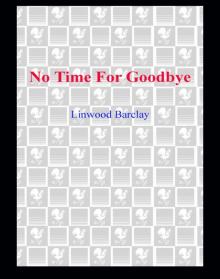 No Time for Goodbye
No Time for Goodbye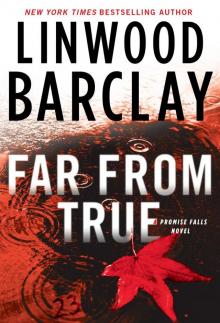 Far From True
Far From True Lone Wolf
Lone Wolf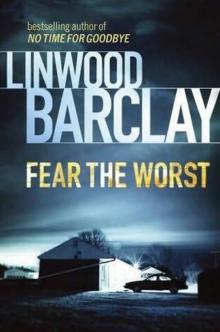 Fear the Worst
Fear the Worst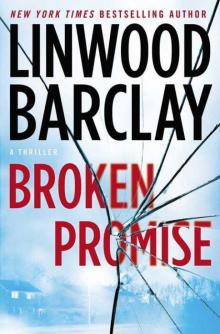 Broken Promise
Broken Promise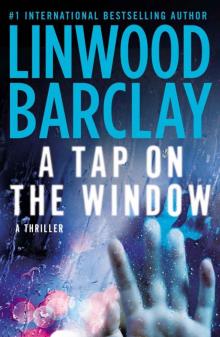 A Tap on the Window
A Tap on the Window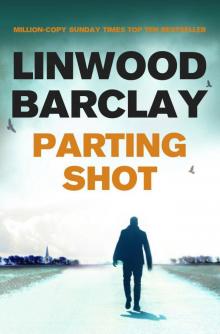 Parting Shot
Parting Shot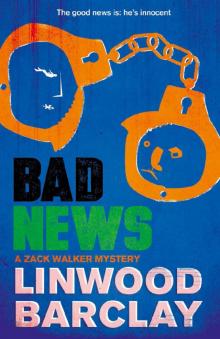 Bad News
Bad News Too Close to Home
Too Close to Home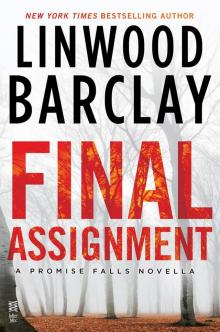 Final Assignment
Final Assignment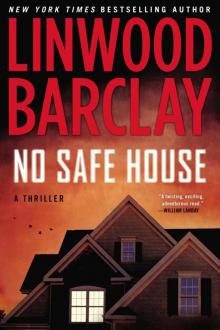 No Safe House
No Safe House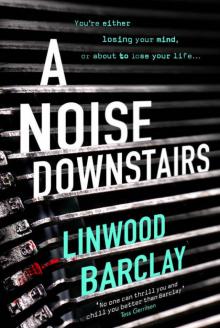 A Noise Downstairs
A Noise Downstairs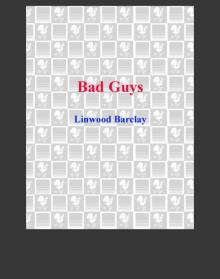 Bad Guys
Bad Guys The Accident
The Accident Stone Rain
Stone Rain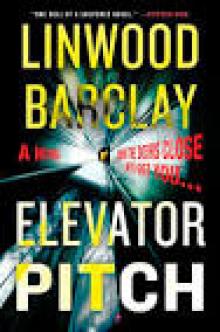 Elevator Pitch
Elevator Pitch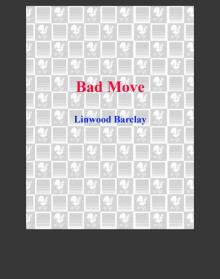 Bad Move
Bad Move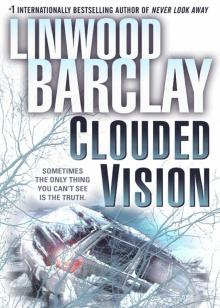 Clouded Vision
Clouded Vision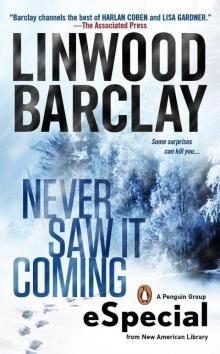 Never Saw It Coming
Never Saw It Coming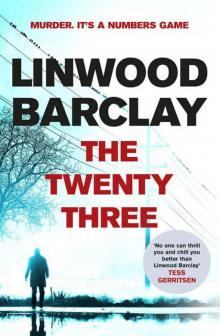 The Twenty-Three
The Twenty-Three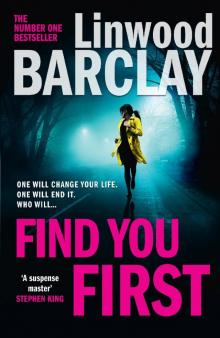 Find You First
Find You First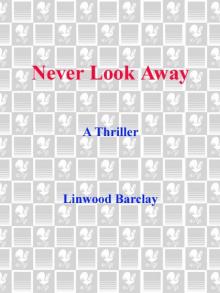 Never Look Away
Never Look Away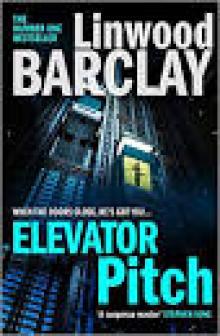 Elevator Pitch (UK)
Elevator Pitch (UK)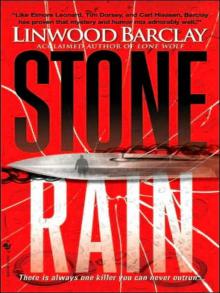 Stone Rain zw-4
Stone Rain zw-4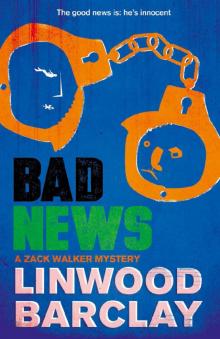 Bad News: A Zack Walker Mystery #4
Bad News: A Zack Walker Mystery #4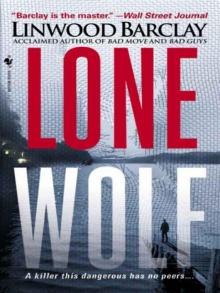 Lone Wolf zw-3
Lone Wolf zw-3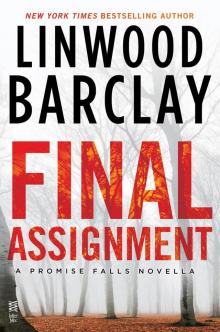 Final Assignment: A Promise Falls Novella
Final Assignment: A Promise Falls Novella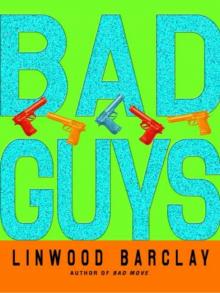 Bad Guys zw-2
Bad Guys zw-2 Never Saw It Coming: (An eSpecial from New American Library)
Never Saw It Coming: (An eSpecial from New American Library)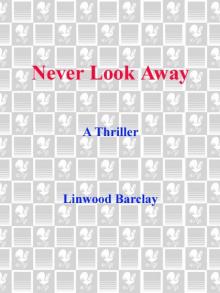 Never Look Away: A Thriller
Never Look Away: A Thriller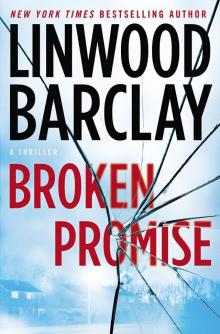 Broken Promise: A Thriller
Broken Promise: A Thriller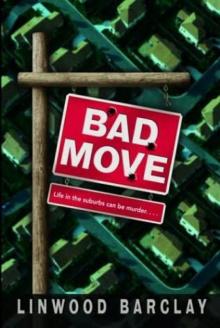 Bad Move zw-1
Bad Move zw-1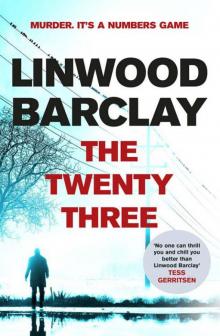 The Twenty-Three 3 (Promise Falls)
The Twenty-Three 3 (Promise Falls)